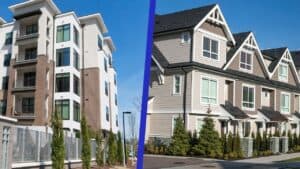Buying a condo might seem like a simpler path to homeownership — especially in urban areas where high rise buildings dominate the skyline. But behind the sleek amenities and high rise views lies a far more complex financing process than you’d find with a typical single-family home.
Whether you’re buying a new construction unit in a luxury tower or an older high-rise in a downtown core, condo financing comes with unique risks, lender requirements, and paperwork that can derail deals if you’re not prepared.
In this guide, we’ll break down the special considerations in condo mortgage financing, how high-rise buildings make things trickier, and how to position your loan for approval.
Why Financing a Condo Is Different from a House
When you apply for a condo mortgage, lenders aren’t just evaluating you — they’re also underwriting the entire building or development. That means your approval depends not only on your credit and income, but also on the financial health, legal structure, and management of the condo project.
For high-rise or mid-rise condos, this means added scrutiny in areas like:
-
Reserve funds and insurance coverage
-
HOA (homeowners association) budgets and delinquencies
-
Pending litigation or construction defects
-
Owner-occupancy rates vs investor/renter ratios
If any of these factors raise red flags, the entire project can be denied by the lender — and your loan may be declined, delayed, or require special terms.
What Makes High-Rise Condo Financing More Complex?
Financing high-rise condos — especially in dense urban areas — adds another layer of complexity beyond standard condo rules. Here’s why:
1. Non-Warrantable Status
High-rise condos often fall into the “non-warrantable” category, meaning they don’t meet Fannie Mae or Freddie Mac’s conventional guidelines. Common reasons include:
-
Too many investor-owned or short-term rental units
-
Inadequate reserve funding in HOA budget
-
Ongoing lawsuits involving the building or HOA
-
New construction projects with less than 50% sold
If a condo is non-warrantable, you’ll typically need a portfolio loan with:
-
Higher interest rates
-
Larger down payments (often 20–30%)
-
More restrictive terms
If you’re considering a non-warrantable condo or a unit with steep HOA dues, it’s important to know how that impacts your qualifying ability. Use our Loan Affordability Calculator and check out Understanding DTI to see how monthly obligations can limit what you’re approved for.
Warrantable vs. Non-Warrantable Condos: A Quick Comparison
| Feature | Warrantable Condo | Non-Warrantable Condo |
|---|---|---|
| Eligible for conventional loans? | ✅ Yes | ❌ No |
| Backed by Fannie/Freddie? | ✅ Yes | ❌ No |
| Typical down payment | 3–10% | 20–30% |
| Appraisal flexibility | Standard | Limited options |
| Interest rates | Lower | Higher |
Understanding whether a condo is warrantable or not is just the first step. Even in buildings that meet the guidelines, your loan terms and monthly costs can vary significantly, especially based on your down payment.
Most conventional condo mortgages require project approval from Fannie Mae or Freddie Mac before the lender can proceed. If you’re unsure of a building’s status, ask your agent or lender to request the project approval certificate early — it could save you from delays or disqualification later in the process.
Also, if your down payment is less than 20%, you’ll likely be required to carry private mortgage insurance (PMI). PMI increases your monthly cost but can be removed once you’ve built enough equity. To learn how PMI works — or how to avoid it altogether — check out our guide:
What Is PMI? A Beginner’s Guide to Private Mortgage Insurance
Keep in mind that even warrantable condos may trigger additional lender scrutiny if the HOA has insufficient reserves, a high percentage of delinquent dues, or a history of litigation. The earlier you understand these risk factors, the smoother your financing process will be.
Key Project-Level Risks That Affect Condo Financing
Lenders dig into these risk factors during condo underwriting — and any one of them can derail your loan.
Structural Deficiencies or Deferred Maintenance
Following incidents like the Surfside, FL condo collapse, lenders now require documentation that buildings are structurally sound and adequately maintained. If a recent inspection or engineer’s report identifies major repair needs, your loan may be suspended.
Pending Litigation
If the HOA is involved in a lawsuit — especially one involving construction defects, mold, or safety — many lenders will flag the project as high risk.
Reserve Funding Shortfalls
Fannie and Freddie require condos to have at least 10% of their annual budget allocated to reserves. If the HOA isn’t funding reserves properly, the project may be ineligible for conventional financing.
Delinquent HOA Dues
If more than 15% of unit owners are behind on HOA dues, it raises concerns about the building’s financial stability — and can result in loan denial.
Too Many Non-Owner-Occupied Units
When more than half of the units in a building are rented out or investor-owned, it increases the lender’s perceived risk of default or HOA mismanagement.
Special Considerations for New Construction and Conversions
Buying a unit in a brand-new high-rise or a converted commercial space? Prepare for even more underwriting hurdles.
New developments often lack:
-
Historical HOA financials
-
Completed insurance coverage
-
Verified occupancy levels
This makes the condo “non-established,” which often requires:
-
Manual underwriting
-
Higher down payments
-
Longer review times
-
Project review fees
Conversions (e.g., turning a hotel or warehouse into condos) also raise concerns around compliance with local codes, permits, and long-term durability of the structure.
Tips to Navigate Condo Mortgage Approval Successfully
-
Get a pre-approval with a condo-savvy lender
Not all lenders handle condos well — especially non-warrantable ones. Work with a lender that has experience with high-rise projects. -
Ask early about project status
Before falling in love with a unit, ask your agent or lender:
“Is this condo project warrantable under Fannie Mae or Freddie Mac guidelines?” -
Request condo project documents ASAP
These include the HOA budget, master insurance policy, condo questionnaire, and reserve studies. These are required for underwriting. -
Be ready for longer closing timelines
Condo loans often take longer than single-family mortgages, especially if the lender needs to complete a full project review. -
Consider FHA or VA options
Looking at FHA or VA loans to finance your condo? These government-backed options can be excellent tools — particularly for first-time buyers and veterans — but only if the building itself is approved by the agency.
The FHA and VA each maintain their own lists of eligible condo projects, and if your building isn’t on the list, your loan will be denied, even if you qualify personally. Before moving forward, search the approved building lists here:
-
FHA Approved Condos – HUD Lookup
-
VA Approved Condos – VA Portal
Want to understand the basics of these loan programs and why they’re such strong options for eligible buyers? Check out our beginner-level guides:
-
Frequently Asked Questions (FAQs)
Why is it harder to finance a condo than a house?
Lenders evaluate both the borrower and the condo building. If the project has financial issues, legal trouble, or too many investor units, your loan may be denied — even if you qualify.
What credit score do I need for a condo mortgage?
Most conventional condo loans require a minimum score of 620, but non-warrantable condos or portfolio loans may require 680+ or higher.
Can I use an FHA or VA loan for a condo?
Yes — but only if the condo building is listed on the FHA or VA’s approved project list. Otherwise, the loan will be denied even if you qualify personally.
Are high-rise condos always non-warrantable?
No, but they often are. High-rise buildings tend to have more rental units, new construction risk, or larger budgets — all of which increase scrutiny.
Can I get a conventional loan on a condo with litigation?
Usually not. Lenders typically decline loans for projects involved in active litigation related to construction, safety, or HOA financial disputes.
Final Thoughts
Condo financing — especially for high-rise units — isn’t just about qualifying as a borrower. It’s about whether the building itself qualifies. From reserve requirements and insurance to owner occupancy and legal risk, there are dozens of hidden hurdles that can derail a condo mortgage.
The key to success is knowing what to ask, working with a lender who understands condos, and gathering project documents early. The more complex the building, the more critical it becomes to prepare — and protect your loan approval timeline.
By taking the right steps upfront, you can confidently navigate the process and avoid surprises when financing your condo dream.
Related Posts

How Many Times Can You Use a VA Loan? Understanding Reuse, Limits, and Entitlement
If you’re a veteran or active-duty service member, the VA loan is one of your most powerful benefits. But many eligible borrowers are

Condo vs Townhouse: Which Is the Smarter Buy for Long-Term Value?
If you’ve narrowed your home search down to a condo or a townhouse, you’re already well ahead of most first-time buyers. But the

What Is a Conventional Loan? A Beginner’s Guide to Flexible Financing
If you’re exploring mortgage options, you’ve likely heard the term conventional loan. But what exactly is it, and how does it compare to

